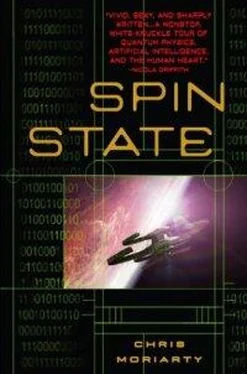Though any speed she could muster was meaningless, she hurried. The call went out. The dedicated line on the Starling lit up like a distant star in the darkness.
First ring.
No answer.
“Come on, Cohen. Be there!”
Second ring. Li felt the AI rising up like a great beast, flexing its computational muscles, gathering its immense bulk to flick off the irritating mote that was her.
“Don’t do this to me, Cohen!”
Third ring. And the Zed was on top of her.
It spun through its security operations so fast that the whole dataspace became an incomprehensible dizzying blur. Li was sinking, spinning. She knew she should jack out, but she couldn’t navigate the system, couldn’t orient herself or even control her own body. Code twisted and convulsed as the Zed overloaded her systems. Her internals froze, jerked, skittered off course. The datastream corrupted. Her own mind, unable to process the overload, betrayed her. She began to hallucinate. The numbers came alive. They pulsed with a cold, deep-sea wakefulness. A mind moved within them, dark, sightless, unsleeping. A mind without words. A mind forged in the pressure of a hundred atmospheres. It circled, searching for her. Stalking her. And she knew with bone-crushing certainty that when it found her she would die.
Far away someone else’s body convulsed and a stool skittered across the deck, wheels shrieking. The phone rang again, but the external datastream was so slow and uncompressed next to the Zed’s dizzying parallel calculations that the ring reached Li’s brain only as a low, Dopplered groan. Even the white noise on the line stretched out until each click and rasp of static became a distorted howl. The darkness within the darkness gathered itself and slid toward her.
Click.
She sensed Cohen’s arrival more than she actually saw it. A river of light washed through the numbers, driving back the darkness. It shone white, as pure and deceptively placid as the sweep of a Himalayan ice field. But it was crushing the Zed, cutting through the semisentient as implacably as a glacier grinding at a mountain. If she’d ever wondered what it was to be the scrap of flesh two sharks fought over, she knew now. She felt… nothing. She heard only her pulse pounding in her skull, and behind that a rushing, whirling silence. She was lost, floating, watching from a tremendous height while two battling giants tore apart the universe.
The lab comp writhed and twisted, desperately spinning through its programs in search of anything that would blunt Cohen’s relentless attack. Then it focused on her, and an icy finger of fear brushed down her spine.
‹Cohen!› she called. And with that one betraying thought, the darkness was upon her.
03:42:12.
The next thing she saw was Cohen. Not the implacable and terrible light, but his normal on-line self. He was running the numbers, doing the job he always did, the job any cracker did. ‹You’re back with us?› he asked, when she mustered enough energy to try a cautious operation.
‹What happened?›
‹No need to worry about it now. I’ll explain later.›
She waited, still weak. There was something comforting about watching him dial through the comp, watching the security codes untangle themselves under his touch and the numbers smooth out and tick past easily, the way they always did for him. Something was off though. ‹How come you’re not singing? › she asked.
‹What?›
‹You always sing when you’re cracking a system. Unless something’s wrong. Is something wrong?›
Digital laughter swirled around her, flickering through the numbers like brush fire. ‹Just because you can’t hear me doesn’t mean I’m not singing.›
‹Don’t try to snow me.›
‹Hang on a minute.› He scanned a promising file and cursed as it came up empty. ‹I’m thinking about the lab AI.›
‹It’s not coming back?› Li asked, feeling panicky.
‹No,› Cohen said. ‹He’s not coming back.› The emphasis on he was slight but unmistakable. A reproach.
‹Then what?›
When he answered, Li could feel the unease in his voice even across the remote line. ‹Ever watched flat film of a horse race?›
‹Sure. Beautiful.›
‹Know what a heartbreaker is?› He went on without waiting for a reply. ‹A heartbreaker is a horse so fast he doesn’t just beat his competitors, he breaks them. Beats them so badly they never run to win again. Horses used to die of it.›
‹You made that up. You’ve probably never seen a horse.›
‹No. Truly. Running to win is what racehorses were. The ultimate single-purpose organism. They couldn’t feed themselves, couldn’t even walk without special shoes humans made for them. But they could run. And they’d run themselves to death, run until their bones shattered. There’s footage of horses doing just that, coming apart on the track like ships burning up on reentry.›
‹That’s crazy, Cohen.›
‹Not crazy. Just human. They were human-built running machines. Just like I’m a thinking machine. Just like you’re a working machine, and every planet in UN space is a food-and-air machine. And when humans are building a machine, everything but the one thing they want it to do tends to fall by the wayside.›
Cohen paused, sidetracked to search a dead-end directory. ‹Anyway, AIs are like racehorses. They’re built to play games. Chess games, probability games, war games. They’re built so that the win is all they want, all they are.›
‹Why are you telling me this?›
‹You just watched a heartbreak race.›
‹With the lab AI?› Li couldn’t get her mind around this vision of how Cohen saw the Zed. ‹Is it… he… dead?›
‹No.› Cohen riffled through a new directory faster than Li could identify it, dropped it, moved on to the next one. ‹He’s still here. Can’t you feel him?›
Cautiously, Li probed the network. She felt something, a dark, vaguely sentient presence. But it was confused, chaotic, diminished. As if the Zed had crept into some dark corner of the network to lick its wounds. ‹So now what?›
‹If he owned his own code, he could contract with a larger AI and try to make his way as an associate system, get some workout equity. Or he could get psychiatric help, reprogramming. But he doesn’t own his code. Alba does. So what will actually happen is this: The techs will come in tomorrow and find, first, that he got cracked by an outside AI, and second, that their top-of-the-line semisentient has just turned into an unbelievably expensive calculator. They’ll try to salvage him, because of the cost if nothing else, and when they can’t they’ll activate his terminal feedback loop, core out the mainframe, and install a new AI.›
Li felt something come through the numbers. Something that was partly indecipherable AI emotion and partly a feeling she didn’t need anyone to explain to her: guilt.
‹Christ, Cohen. It’s not your fault. What else were you supposed to do?›
‹Nothing. But that doesn’t make it any nicer, does it?›
‹You think you have to tell me that?›
Another long silence. ‹No.›
03:51:02.
‹Bad news.›
‹What?›
‹I found the data. But I can’t access it from here. You’ll need to get into another lab and jack a remote terminal before I can get it.›
Li checked their time and swallowed.
After a tense silence, Cohen said, ‹What do you want to do?›
She twitched, nerves stretched to the breaking point. ‹What do you mean, what do I want to do? We go get it.›
‹You’re sure?›
‹Of course I’m sure.›
04:01:00.
She looked around the corner, saw an empty passage and started forward. ‹Cohen?› she asked.
‹?›
Читать дальше












